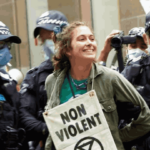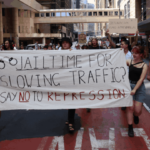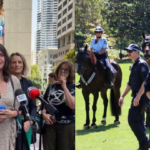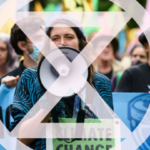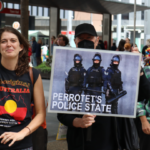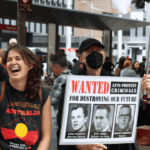Thirty-Ninth Arrest for Climate: Violet CoCo on Repeatedly Sacrificing Liberty for Planet
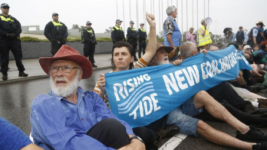
The recent Rising Tide Newcastle Coal Port blockade successfully disrupted the shipping lane into the world’s largest coal port, and it did this for an extended number of hours on Sunday 24 November, even with the massive state repressions that the NSW government imposed upon the direct action.
And this was further despite the histrionics of NSW authorities in the lead up to it, as the NSW police commissioner took event organisers to the NSW Supreme Court to ensure their demonstration was unauthorised, which meant they were not immune to police powers, while premier Chris Minns attempted to impose an exclusion zone that prohibited the entire waterway.
The blockade on Awabakal and Worimi land further triumphed against the imposition of the 2022 NSW antiprotest regime that, up until 24 November Rising Tide blockade, had been successful in scaring off the growing disruptive climate actions that had been sweeping the Greater Sydney region in the early months of 2022, prior to the rolling out of these draconian laws on 1 April that year.
Indeed, what was unprecedented on 24 November was over 200 normal people took to the shipping lane of Newcastle Harbour, with the full understanding that they were not only risking arrest for breaching the law, but this could also result in them having to face maximum penalties of up to 2 years imprisonment and/or a $22,000 fine, and yet, they all put their liberty on the line anyway.
Severe penalties lack deterrence
Enacted into law by a NSW Coalition government with bipartisan approval on 1 April 2022, the NSW antiprotest regime comprises of two offences, making the unauthorised disruption of a bridge, tunnel or road in Greater Sydney, Wollongong and Newcastle, along with certain major facilities, an illegal act that carries maximum penalties of up to 2 years gaol time and/or a $22,000 fine.
The imposition of what MUA Sydney branch secretary Paul Keating has described as the most authoritarian protest regime on the planet came at a point in time when climate defence groups Fireproof Australia and Blockade Australia had been gaining traction in raising the alarm about the climate emergency in this state, as their direct actions were fast becoming ubiquitous.
The recent Rising Tide protest saw 138 individuals willingly put themselves in a position that resulted in their being charged with the crime of disruption of a major facility, contrary to section 214A of the Crimes Act 1900 (NSW). Under these laws, all ports in NSW are considered major facilities.
So, the fact that over 200 civilians were willing to risk these severe penalties has certainly shown that any deterrent effect the NSW antiprotest regime had is fast waning.
Putting it on the line for climate
Well-known climate defender Violet CoCo was the first person to be arrested under the NSW antiprotest regime on 13 April 2022, when she was taken into custody over having partaken in a nonviolent direct action that resulted in one lane of the Sydney Harbour Bridge being blocked.
CoCo was then sentenced to 15 months prison time. However, after a 13 day stint inside and a long period under house arrest on bail, CoCo was resentenced to a 12 month conditional release order (CRO).
And this came after it was revealed in a related case a week prior, that the NSW police complaint about her actions having blocked an ambulance wanting to take the bridge were completely false.
Following the recent Rising Tide action, CoCo participated in a subsequent protest before Parliament House in Canberra. And she was arrested and is now facing a first mention in the ACT Magistrates Court on Thursday 19 December, in respect of one count of obstructing a road.
This is Violet’s 39th arrest for climate since 16 May 2019, and Sydney Criminal Lawyers spoke to CoCo this week, about why she’s continuing to put her liberty on the line like this after having risked so much already.
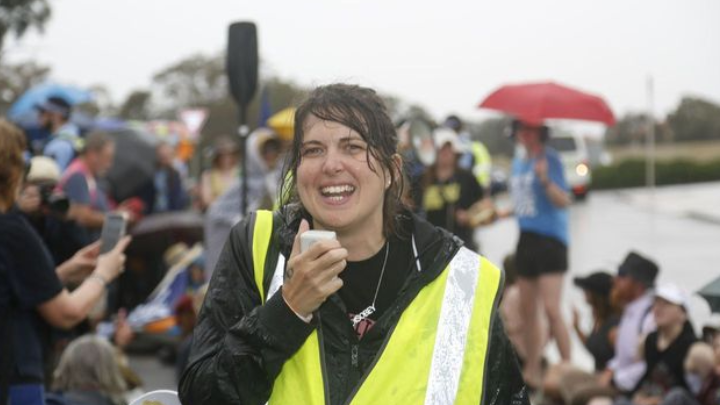
Twenty-two Rising Tide supporters were arrested on Ngunnawal Country out the front of Parliament House in Canberra on 27 November. Rising Tide is a Newcastle-based climate defence group. And you were amongst those arrested on the day.
So, Violet, why did Rising Tide stage a demonstration in the capital?
Rising Tide were mobilising in the capital because it’s part of Rising Tide’s core strategy to target the problem, and there are a lot of problems in that place.
Before I go on, I want to make it explicit that I do not talk on behalf of Rising Tide in any way.
I attended the event as a person who is interested in direct action on climate, and not as part of the core group.
However, in saying that, during the mobilisation, there was a practice of bottom-up decision-making throughout the entire event through spokes councils, which was very exciting and I hope to talk about that later on in the interview.
Back to the problem of parliament, one of a plethora of parliament’s problems is, of course, that they actively operate against the scientific and traditional knowledge of how to care for our only home – Planet Earth.
It could not be more simple, we need to keep fossil fuels in the ground, engage in drawdown and protect our biodiversity.
Yet more and more fossil fuel projects get rammed through parliament – about as thick and fast as the antiprotest laws – to protect them from the community’s dissent to these projects.
On 27 November, the collective had three simultaneous actions. Rising Tide climate defenders disrupted parliament by sitting in the foyer because the climate crisis is disrupting our communities with fires, floods and extreme weather.
This resulted in around thirty people, including Knitting Nannas, being banned from Parliament House precinct for three months.
A Rising Tide banner was dropped from a gallery in the foyer of Parliament House and was quickly removed. It read, “Albo: Stop New coal and gas or we will.”
Lastly, protesters also occupied the road around Parliament House for fifty minutes, sitting on the road, with some in kayaks. More than twenty people were arrested, singing, “We are rising, rising in defiance. Till they listen, listen to the science.”
The Rising Tide People’s Blockade of the World’s Largest Coal Port was successful in achieving its goal over the weekend of 22 to 24 November.
The climate defence group didn’t block Newcastle Harbour for the entire weekend, but it did disrupt the shipping lane into the port on Sunday morning and early afternoon, which resulted in a coal ship turning away, so that its scheduled arrival was delayed.
This occurred despite the draconian NSW antiprotest regime. It also transpired despite NSW police having had the NSW Supreme Court strike down authorisation of the protest and a further attempt by the Minns government to have an exclusion zone in place, banning all people from the entire waterway.
What do you think it means for the people to have continued on with their aim, despite the massive state repressions thrown at them, and to have then triumphed over the government in this manner?
It’s a really good sign for the strength of the climate movement and the courage of those involved.
All these different people with diverse experience in protest were willing to breach the arbitrary line of yellow boys the police put up as a scare tactic.
They knew in their hearts that stopping coal was more important than whatever the police had in store.
Of course, many of those activists are still going through the courts, and it’s important that the solidarity of the movement follows those cases.
The other massive win was that a climate camp was able to hold that spot on the foreshore, with big shade marquees, tents and capacity to feed everyone.
It’s a massive win, and it was because of all of the volunteers who kept the space clean and operative – big thanks to all the volunteers as well.
Of course, no shade was permitted on the beach front of the protest and we had many people with heatstroke and sunburn.
Ultimately, it’s a massive win for the climate justice community and Rising Tide has done a magnificent job of pulling it all together.
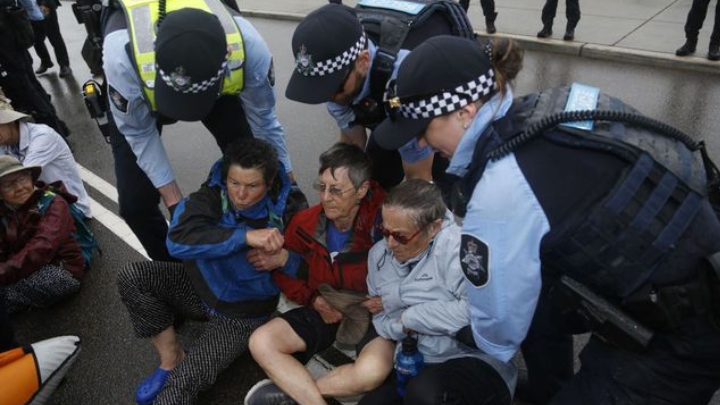
The Rising Tide People’s Protest was also notable, as when demonstrators did achieve their goal, 170 were arrested and 138 of those people were then charged with one of the draconian offences that make up the 2022 antiprotest regime.
These laws had been successful in stamping out unauthorised protests for the most part in this state until the Rising Tide protest in Newcastle last month, as the regime did not deter more than 200 people in getting out and blocking Newcastle Harbour regardless of any potential two year gaol stint.
So, what does this say about the NSW antiprotest regime now? Do you think the dismissal of it by so many ordinary citizens will have an impact on its effectiveness going forward?
The antiprotest laws were put in to scare people into complacency about climate breakdown, but they seriously underestimated people’s survival instincts.
The average person on this continent is smart enough to know that climate is a serious issue, and that fossil fuels are a big part of the problem.
It’s also plain to the average punter that the very first and most urgent hurdle is the global community agreeing to no new coal, gas or oil.
Yet, during the current term of parliament, 32 new coal projects have been approved or are in the approval process under the Labor government.
This is an intergenerational climate crime.
In targeting the world’s largest coal port, Rising Tide have highlighted that this continent is, in fact, the third largest exporter of carbon emissions, and we have a huge responsibility here to keep coal in the ground.
Our very lives are at stake if a just transition is not adopted at emergency speed.
Mostly people are good, and when presented with the opportunity to make the world a better place – even at personal cost – many are willing to.
This altruistic community is getting bolder, willing to take more risks and willing to give more time.
In the face of staving off climate despair, as temperatures soar, action seems the only antidote. If the government won’t take action to shut down the systems of destruction, then we, the people, will.
It’s a great sign that so many people stepped into their courage on the weekend and broke those laws. It sets a path forward for us all.
As Martin Luther King Junior says, “One has a moral duty to disobey unjust laws.”
The attention being paid to climate was more prominent back at the end of the 2019-20 Black Summer of bushfires and the subsequent flooding crises along the eastern seaboard.
At the time of your April 2022 Harbour Bridge arrest, there was also more of a focus on climate in the public sphere, and the antiprotest regime was all about stifling this.
But despite the lesser focus, extreme weather events are taking place somewhere around the globe 24/7 these days.
Violet, what’s your understanding of where the climate crisis is at presently?
We are in the climate end game. What we do now is of vital importance, because the systems of climate are so massive, the effects of today’s emissions are locked in for generations to come.
It’s important that people understand that we are seeing tipping points in the system that are teetering us towards a path of no return, where we risk the collapse of civilisation.
What I mean by this is that the globe will heat up so much, and the ecosystems that regulate biodiversity have been raped so thoroughly, that we will no longer be able to feed ourselves or be safe in our houses due to violent weather. At that point social cohesion is difficult, if not deadly.
Unfortunately, we live in a world where someone throwing soup on a painting gets more talk about climate than when one-third of Pakistan is underwater.
Thirty-three million people in Pakistan, half children, completely lost their homes, washed away in unprecedented floods, yet soup on the perspex covering of a painting gets way more conversations on climate.
We need to do bold things to keep climate in the media and in the minds of folks, to get the message out, that we are running out of time, and that our leaders are failing us, and it’s up to us ordinary people to organise and change that trajectory.
This is possible. I have enormous faith in human ingenuity: we can repair our ecosystems.
We can move away from an attitude of dominance of nature into reverence and respect.
But it’s going to take people being re-educated after the lies and spin of the fossil fuel industry. Shout out to the well-researched book Slick by Royce Kurmelovs. Read it to find out more about the spin doctors of the industry.
Ultimately, this is a failure of our democratic system to operate in the best interests of the people it serves, rather than vested interests.
This is why I believe in the Extinction Rebellion (XR) theory of change and citizens’ assemblies as the solution out of this crisis. Much like the assemblies held during the Rising Tide mobilisation, we need a bottom-up solution.
Morning and night, at the Rising Tide assemblies, representatives from diverse communities would gather together and discuss logistics and strategy. It functioned extremely well – the people’s democracy – and it was just as thrilling for me as was stopping a coal ship.
Your recent arrest in Canberra was your 39th arrest in defence of climate. You also spent around two months in a Melbourne prison this year due to a direct climate action you undertook that blocked the Naarm-Melbourne Westgate Bridge.
What sort of toll is putting your liberty on the line like this taking? Why are you continuing to put it on the line after so many brushes with the law? And do you consider your actions are having something of an eroding effect on the fear of the law when a climate emergency is looming?
I know that courage is contagious. History is thick with people who have faced much worse than I have in the name of justice. I stand on the shoulders of giants who inspire me.
Nothing can prepare you for the challenges of state repression though, it can come down hard and heavy, often after ‘getting away with it’ for a very long time.
But from that very first XR talk called, “Heading for extinction, and what to do about it”, I knew prison was a possible trajectory for me.
The talk explained the social science behind peaceful people being (a) disruptive and (b) making personal sacrifices to draw attention and sympathy, which increases engagement and care.
This increases the number of people invested in the issue: the images that mobilised people to protect the Franklin were those of people being arrested in front of bulldozers.
The talk also explored how we have tried every other possible way to achieve change, and that the system is so rigged that civil resistance is our best and last hope.
I knew that prison was a likely outcome for myself. It was a much easier choice for me than some, as someone who doesn’t have kids or assets.
I really hope I don’t go to prison again. I hope that we can see meaningful change before that happens.
But it’s a sacrifice I am willing to make to be a part of the story to create a better future than the fossil fools have dreamt up.
Also, I know, relatively speaking, I would be going into arrest and prison with a lot of privilege on my side.
Nelson Mandela says, “Fear of prison is a tremendous hinderance to a liberation struggle.”
I do get afraid though. I am only human. What gives me courage is to know I don’t face it alone. Even when they put me in a box, the community sent letters and pictures that kept me company.
I am facing gaol again at the end of January, predicted three to six months for protecting the giant trees in Styx, Tasmania.
I am not sorry I protected those trees. Tasmania has also been subject to new antiprotest laws, to help facilitate the decimation of native forests against community dissent.
Just like ending fossil fuels, the protection of our biodiversity is going to be pivotal in protecting the liveability of our planet.
So, I see every charge that they give me for protecting it as a badge of honour.
And lastly, Violet, the Rising Tide action succeeding against all the odds appears to portend that the fight for climate has not been crushed by the onslaught of state repressions. But it’s getting later in the day in terms of the climate crisis.
So, how do you and others in the local climate movement consider the campaign is shaping up post the success of Newcastle? Has the Rising Tide action set something of a precedent?
Rising Tide is certainly the largest gathering we have seen of environment defenders since COVID decimated numbers.
Those numbers were on the rise with Extinction Rebellion and School Strike for Climate in 2019.
Rising Tide is holding the same place in the movement that XR did. It was full of doctors and kids. It was bright colours and full of energy and momentum.
I pray that Rising Tide continues to grow and continues to bring ordinary people into civil resistance and the power of the people.
Of course, we need an ecosystem of movements and tactics to win this fight. A diverse movement with diverse issues coming together.
For example, the Ngunnawal part of Rising Tide was held at the Aboriginal Tent Embassy. Our hosts shared with us the case of the six missing men, who the police refused to look for or to give an offer of reward, with the racist statement, “Maybe he went for a walk.”
It was a proud moment when Rising Tide echoed the voice of Gwenda Stanley, in saying, “Bring them home.”
Just a few days later a $20,000 reward was offered.
We need to bridge our differences and learn to work together. To hear the many ways in which this system is crippling us.
From housing to healthcare, from First Nations justice to peace in the Middle East, we need to sing a united voice for peace, justice and a liveable planet.
We need to inspire each other, and we need most of all to step into our courage, because this will only get more uncomfortable before we win.


